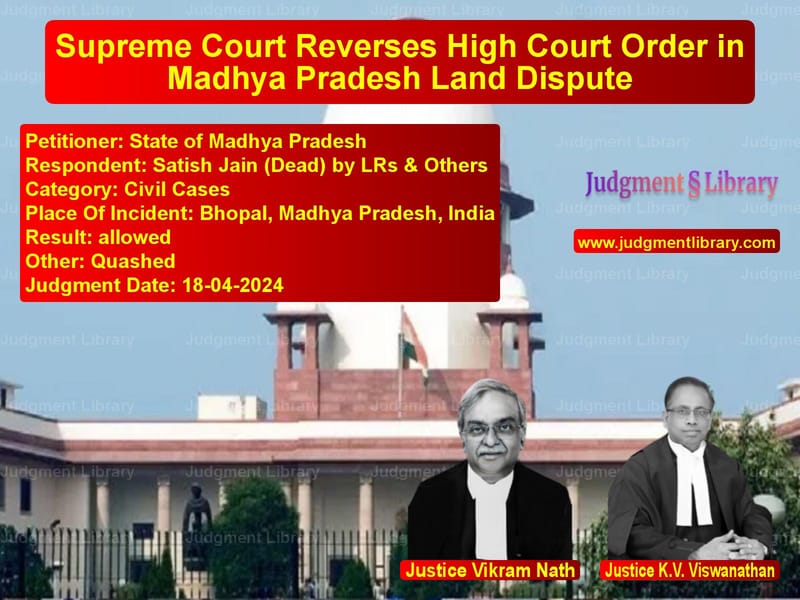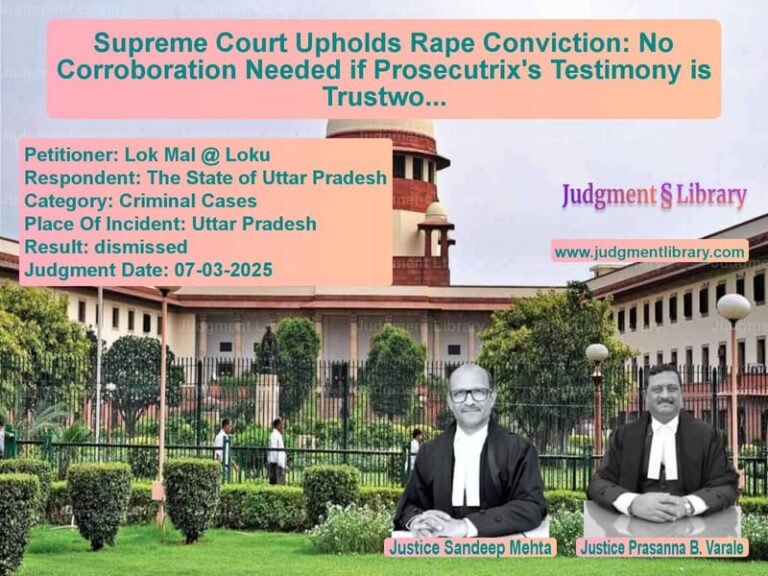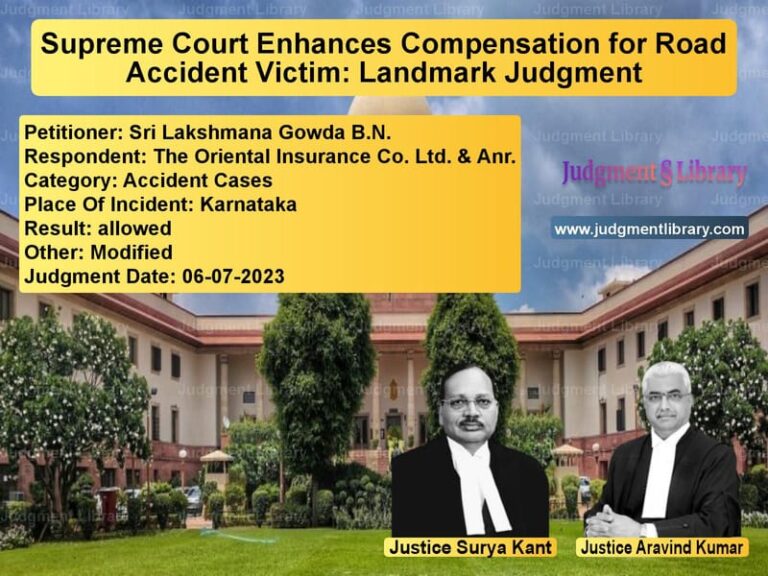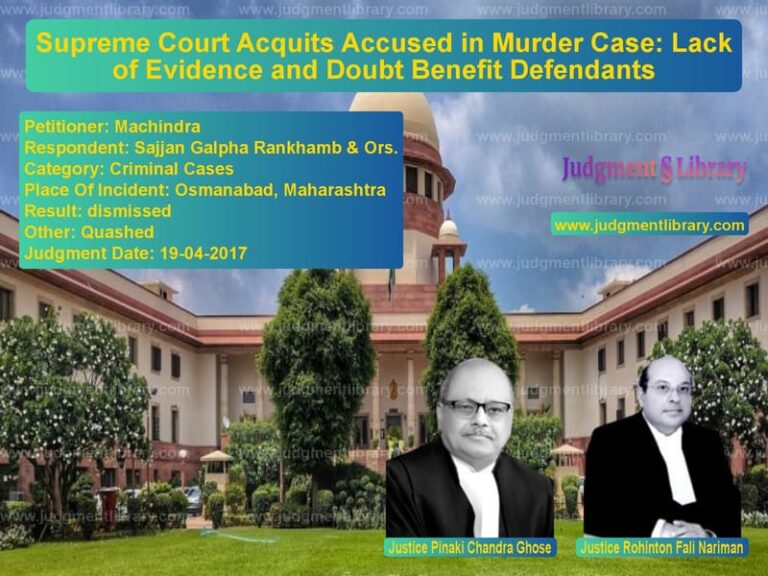Supreme Court Reverses High Court Order in Madhya Pradesh Land Dispute
The Supreme Court of India has ruled in favor of the State of Madhya Pradesh in a long-standing land dispute involving the Bhopal Municipal Corporation (BMC) and the legal heirs of Satish Jain. The case, State of Madhya Pradesh vs. Satish Jain (Dead) by LRs & Others, addressed key issues related to adverse possession claims, arbitration awards, and government land allotment.
Background of the Case
The dispute revolved around 3.53 acres of land situated in Village Halalpur, Tehsil Huzur, District Bhopal, registered as Khasra Nos. 48 & 49. The State of Madhya Pradesh claimed ownership of the land, while the legal heirs of Satish Jain argued that they had acquired it through adverse possession.
The case’s complexity increased when the Bhopal Municipal Corporation (BMC) entered into an agreement with Satish Jain in 1991 to vacate the land in exchange for alternative plots. However, the ex-parte decree that initially favored Satish Jain was later set aside, raising legal questions about the validity of the agreement.
Key Legal Issues
- Whether the plaintiff’s claim of adverse possession over government land was valid.
- Whether the arbitration award favoring Satish Jain’s legal heirs should be upheld.
- Whether the Bhopal Municipal Corporation had the authority to enter into a settlement agreement involving government land.
- Whether the High Court erred in setting aside the Trial Court’s rejection of the arbitration award.
Arguments by the Appellant (State of Madhya Pradesh)
- The suit land was government-owned and could not be claimed through adverse possession.
- The ex-parte decree that originally declared Satish Jain’s possession as valid had already been set aside.
- The BMC had no authority to enter into an agreement involving state-owned land without government approval.
- The arbitration award was invalid as it was based on an agreement that had no legal standing.
Arguments by the Respondents (Legal Heirs of Satish Jain)
- Satish Jain had been in continuous possession of the land for over 50 years, fulfilling the criteria for adverse possession.
- The BMC agreement of 1991 was valid, and the government should honor the settlement.
- The arbitration award was legally binding and should be enforced by the courts.
- The High Court correctly set aside the Trial Court’s order and directed the implementation of the arbitration award.
Supreme Court’s Judgment
The Supreme Court overturned the High Court’s decision and ruled in favor of the State of Madhya Pradesh.
1. Adverse Possession Claim Rejected
- The Court held that adverse possession cannot be claimed over government land.
- Since the ex-parte decree had already been set aside, the respondents had no legal claim over the land.
2. Arbitration Award Declared Invalid
- The Court ruled that the arbitration award was based on an unenforceable agreement and could not be implemented.
- The BMC had no authority to negotiate land ownership matters on behalf of the state.
3. High Court’s Decision Set Aside
- The Supreme Court found that the High Court had erred in reinstating the arbitration award.
- The Trial Court’s order rejecting the award was restored.
4. Future Proceedings
- The Supreme Court directed the Trial Court to proceed with the case based on evidence, ensuring that the state’s ownership rights were protected.
- The respondents were barred from making further claims based on adverse possession.
Legal Implications of the Judgment
This ruling has significant implications for land disputes involving government property:
- Reaffirmation of State Ownership: The decision reinforces that government land cannot be claimed through adverse possession.
- Limitations on Arbitration in Public Land Disputes: Arbitration awards must be based on legally valid agreements.
- Restriction on Unauthorized Agreements: Municipal bodies cannot enter into settlements involving state-owned land without approval.
Conclusion
The Supreme Court’s ruling in State of Madhya Pradesh vs. Satish Jain & Others upholds the principle that public land cannot be acquired through adverse possession. By setting aside the High Court’s ruling, the judgment ensures that government property remains protected from unauthorized claims and reinforces legal procedures in land ownership disputes.
Petitioner Name: State of Madhya Pradesh.Respondent Name: Satish Jain (Dead) by LRs & Others.Judgment By: Justice Vikram Nath, Justice K.V. Viswanathan.Place Of Incident: Bhopal, Madhya Pradesh, India.Judgment Date: 18-04-2024.
Don’t miss out on the full details! Download the complete judgment in PDF format below and gain valuable insights instantly!
Download Judgment: state-of-madhya-prad-vs-satish-jain-(dead)-b-supreme-court-of-india-judgment-dated-18-04-2024.pdf
Directly Download Judgment: Directly download this Judgment
See all petitions in Property Disputes
See all petitions in Contract Disputes
See all petitions in Landlord-Tenant Disputes
See all petitions in Judgment by Vikram Nath
See all petitions in Judgment by K.V. Viswanathan
See all petitions in allowed
See all petitions in Quashed
See all petitions in supreme court of India judgments April 2024
See all petitions in 2024 judgments
See all posts in Civil Cases Category
See all allowed petitions in Civil Cases Category
See all Dismissed petitions in Civil Cases Category
See all partially allowed petitions in Civil Cases Category







